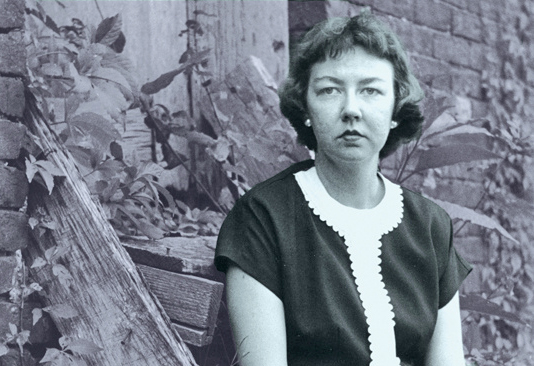
This letter was written to a recipient who, according to editor Sally Fitzgerald, wished to remain anonymous in the published collection of O’Connor’s correspondences. “A”‘s identity was later revealed to be Elizabeth “Betty” Hester, to whom O’Connor wrote more frequently than anyone else. Here, O’Connor discusses contemporary Catholic spiritual writings, which she believes “can be very dangerous.” She goes on to discuss how “needing people badly and not getting them” can fuel a writer’s creativity.
August 11, 1956
Milledgeville, GA
Dear “A.,”
Well you are mighty right about the low rate of pious exchange. I told Mrs. H. I would pray for her but I doubt if I have thought about it twice…But remember the prayer in the Mass for the 11th Sun. after Pentecost, asking “to take away from us those things which our conscience feareth and to add that which our prayer presumeth not to ask.” No more can be said in the way of asking for anything.
You may be right about Msgr. Guardini not wearing well but I haven’t read The Lord but once and that some time ago. The book on the Rosary is a watered-down version of the former. In the fall there is going to be a new one called The End of the Modern World, which Mrs. H. was to get for me. I have been meaning to read The Lord again and will do it with what you say in mind. However, my evaluations of these people all have a background…to go against which makes them seem highly superior. If Msgr. Guardini is the Msgr. Sheen of Europe then that only says how far Europe is ahead of us on that score…Furthermore, almost any spiritual writer ought to wear thin for you. It’s like reading criticism of poetry all the time and not reading the poetry. Spiritual writers have a limited purpose and can be very dangerous, I suppose…
I think more and more of what writers with Christian concerns write against. I don’t mean in a polemical way I mean maybe the climate they write in. It affects fiction writers as well as people like him. But I must have said this before. I forget by now what all of my mental mumblings I have laid in your lap. When I first started writing to you I was careful to try to say what I had to say in a clear way as I was conscious of the fact that I might be the only person inside the Church who would get a chance to talk to you. But now if I relapse into my natural vagueness, it is because I find that you sometimes appear to know better what I am trying to say than I do; and also it is you now who is in a position to help me. And do.
I suppose what I mean about my father is that he would have written well if he could have. He wrote all the time, one thing or another, mostly speeches and local political stuff. Needing people badly and not getting them may turn you in a creative direction, provided you have the other requirements. He needed the people I guess and got them. Or rather wanted them and got them. I wanted them and didn’t. We are all rather blessed in our deprivations if we let ourselves be, I suppose…
Yours,
Flannery
From The Habit of Being: Letters of Flannery O’Connor. Edited by Sally Fitzgerald. New York: FSG, 1979. pp. 168-169.
FURTHER READING
Explore the philosophical, spiritual and literary writings of Romano Guardini, a Catholic priest and significant 20th-century theologian who Flannery O’Connor references in this letter.
Read a travelogue-like guide to O’Connor’s Milledgville, GA, where she lived for most of her adult life.
Read an essay in The Guardian about how O’Connor’s often violent fictions are related to her Catholic literary identity.


